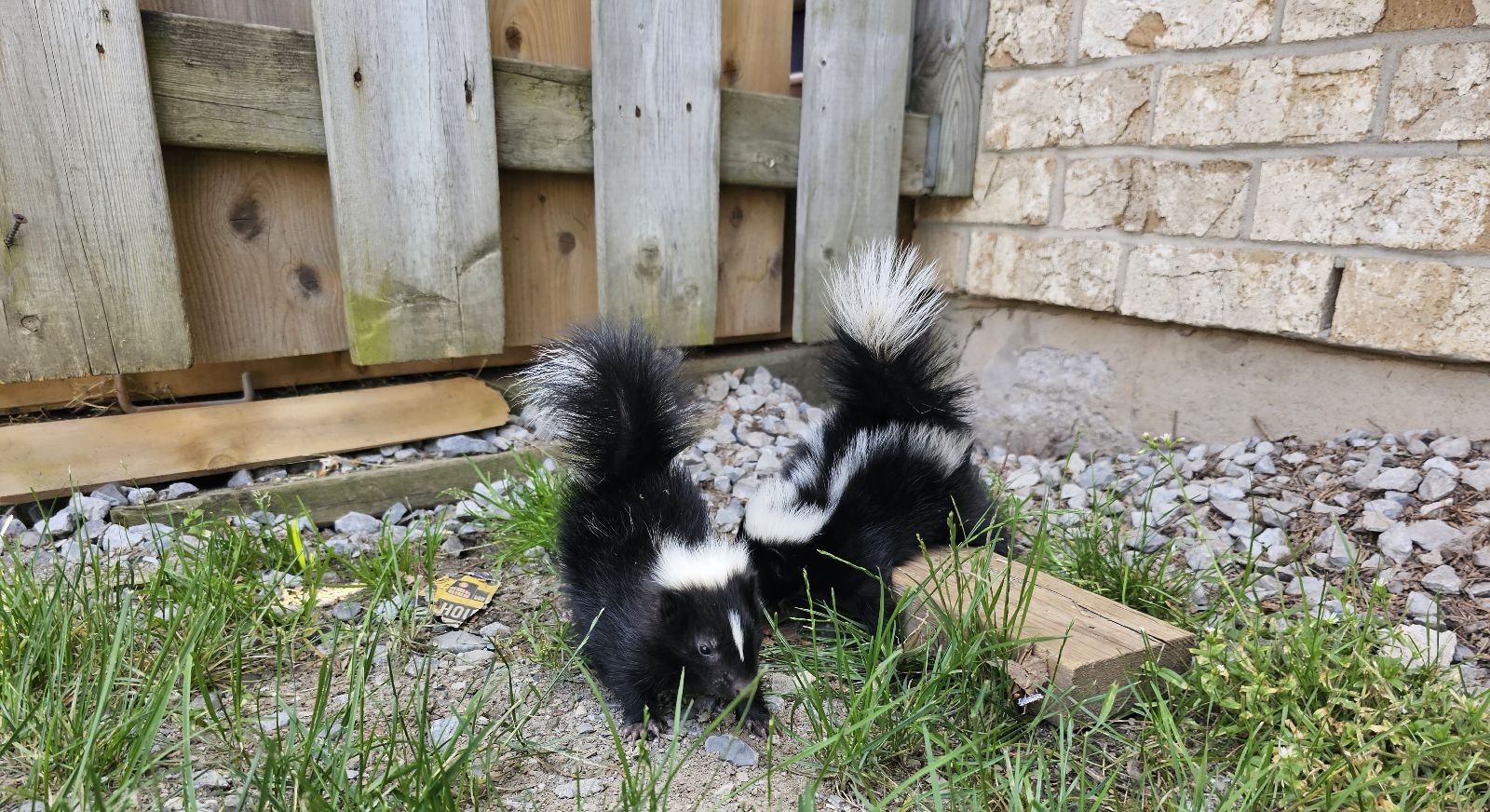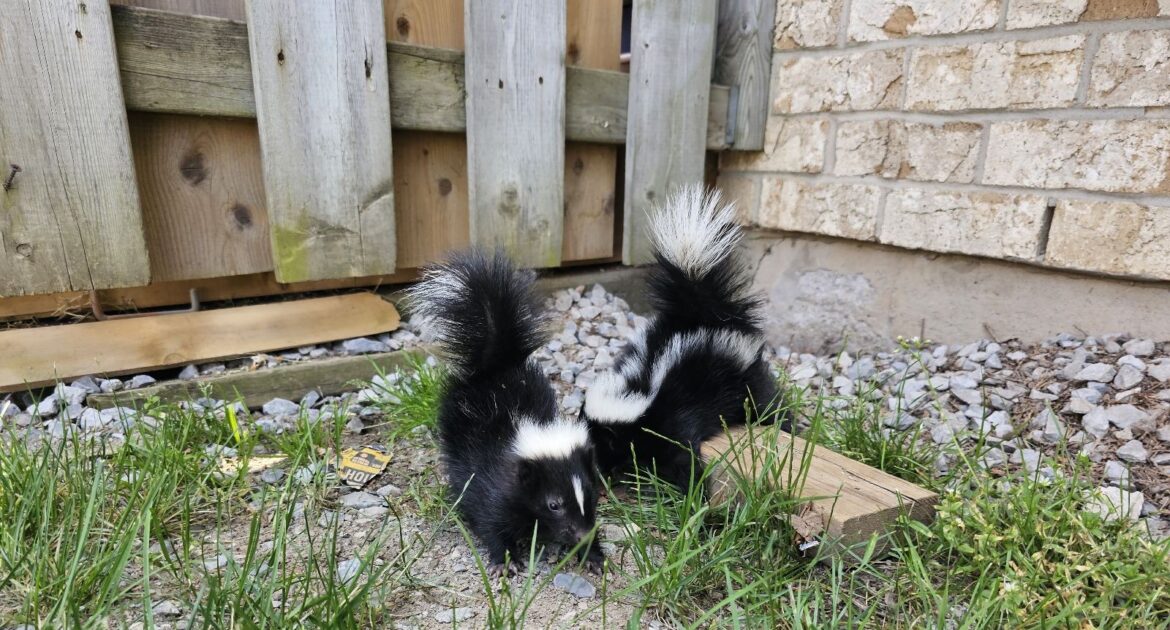When you think about skunks, the first thing that might come to mind is their infamous spray. But these creatures pose risks far beyond their unpleasant smell. Skunks can carry diseases that can easily spread to humans, creating serious health problems. The skunk disease risks they bring shouldn’t be ignored, as they range from bacterial infections to life-threatening viruses.
Living in York Region, spotting skunks in neighbourhoods or yards isn’t unusual. They often wander around during dawn or dusk, seeming harmless at first glance. However, the closer they get to your home, the more likely you are to encounter diseases from skunks. Whether through their droppings, saliva, or contamination of outdoor spaces, skunks can introduce skunk health hazards that affect you, your family, and your pets.
When skunks are living near your property, resolving the problem safely and quickly is important. At Skedaddle Humane Wildlife Control, we specialize in humane methods that remove skunks effectively while keeping everyone safe. This article takes a closer look at the most common diseases skunks can spread and explains why you might need professional help to protect your health and home.
Rabies
Rabies is one of the most serious skunk disease risks and is almost always fatal without treatment. Skunks are one of the top carriers of rabies in Canada, and humans can catch it through bites, scratches, or contact with infected skunk saliva. If the saliva enters your body through a wound, your eyes, or your mouth, the disease can spread quickly.
Once a person begins showing symptoms, rabies is almost impossible to treat. Warning signs may start mild, like fever or headache, but the disease rapidly worsens with symptoms such as hallucinations, trouble swallowing, and paralysis. Acting fast after exposure is critical.
Here’s how rabies spreads and why it’s so dangerous:
- Bite or Scratch: The virus enters your body directly.
- Contact with Saliva: Even without a bite, saliva can infect open skin or sensitive areas.
- Rapid Progression: Rabies attacks the nervous system and spreads to the brain quickly.
Never approach a skunk that seems aggressive, disoriented, or foaming at the mouth. If you suspect any exposure to rabies, get medical help immediately and avoid handling the skunk yourself.
Leptospirosis
Leptospirosis is a bacterial infection spread through the urine of infected animals, including skunks. Their urine can seep into soil, puddles, or outdoor areas, putting humans and pets at risk. You can become infected by touching these contaminated areas, especially if you have cuts, scrapes or come in contact with mucous membranes like your eyes or mouth.
Early symptoms of leptospirosis include fever and muscle pain, but severe cases could result in kidney or liver damage, meningitis, or lung problems.
Ways leptospirosis spreads include:
- Contaminated Water: Skunk urine mixes with puddles or pond water, creating a health hazard.
- Dirty Surfaces: Tools, garden furniture, or other outdoor equipment can carry harmful bacteria.
- Pet Exposure: Dogs may step into contaminated soil and bring bacteria into your home.
If you notice skunks visiting your property or leaving puddles of urine in your yard, get help to avoid growing risks.
Roundworm (Baylisascaris)
When skunks leave droppings around your property, they bring the added threat of roundworms. These parasites are particularly harmful to children or people with weaker immune systems. Roundworm eggs can survive for years in soil or surfaces, making it easy to become infected. If someone accidentally ingests the eggs, serious complications can occur.
Roundworm infections may cause nausea, fatigue, or fever. But in more severe cases, roundworms can damage the brain, spinal cord, or other organs.
Factors that increase exposure to roundworms include:
- Hidden Feces: Skunks often leave droppings under porches, garages, or garden sheds.
- Accidental Contamination: Children playing in soil or dirt might touch eggs and spread them.
- Egg Durability: Roundworm eggs are tough and can survive extreme weather.
Keeping your yard clean and clear of skunk droppings is one of the best ways to protect your home from this parasite.
Canine Distemper
Though canine distemper doesn’t transmit directly to humans, this disease is a significant “skunk health hazard” for pet owners. Skunks are known carriers of the virus, which affects dogs and some types of wildlife. While adult humans aren’t at risk, their dogs are, especially if exposed to a skunk, showing symptoms like disorientation or aggressive behaviour.
Symptoms to watch for in pets include coughing, fever, discharge from the eyes or nose, and seizures. The virus is highly contagious among animals, and infected skunks can pass it on to dogs through bites or shared water or food sources. This makes removing skunks from your property crucial for safeguarding your pets’ health.
Tularemia
Tularemia is a rare bacterial disease that humans can get through direct contact with infected wildlife. Skunks may carry tularemia, and humans can get it by touching their fur or being bitten by insects like ticks that previously fed on the skunk.
Symptoms of tularemia include fever, swollen lymph nodes, and breathing trouble. Serious cases can lead to lung inflammation and other complications.
The dangers of tularemia include:
- Tick Exposure: Ticks on skunks can indirectly transmit the bacteria to humans.
- Direct Contact: Touching an infected skunk’s fur or droppings spreads the disease.
- Contaminated Soil or Water: Areas frequented by skunks are often heavily contaminated.
By keeping skunks away from your home, you can reduce the chance of contracting tularemia or carrying the bacteria into your living spaces.
How Skunks Spread Diseases
Skunks can spread diseases in several ways. Here’s a breakdown of the most common transmission methods to help you understand the health hazards these animals bring:
- Bites or Scratches: Rabies is the biggest concern here, though other infections can happen as well.
- Contact with Saliva, Urine, or Droppings: These fluids carry bacteria and viruses that contaminate outdoor areas.
- Parasites: Fleas and ticks that live on skunks often carry other diseases, like tularemia.
- Environmental Damage: Gardens, decks, and sheds become contaminated when skunks pass through.
Keeping your outdoor spaces clean and safe is important in reducing the risks posed by these diseases.
Protect Your Family Against Skunk Health Hazards
The diseases from skunks are more than just a nuisance. They can be dangerous for humans and pets alike, with risks ranging from minor bacterial infections to life-threatening illnesses. Trying to handle these animals or their waste on your own only increases your exposure.
Skedaddle Humane Wildlife Control in York Region provides safe and effective skunk removal options. They use humane one-way doors that allow skunks to leave your property without letting them return. These methods keep wildlife safe while making sure your household is fully protected. Skedaddle’s team also inspects and seals entry points to prevent future skunk activity.
Take Action Against Skunk Disease Risks
Seeing skunks near your home isn’t just an inconvenience; it’s a health problem waiting to happen. The diseases from skunks can have serious effects on your well-being. Rabies, leptospirosis, and other skunk health hazards are reasons enough to act quickly.
Contact Skedaddle Humane Wildlife Control in York Region to safely remove skunks from your property and keep your family safe. Request an estimate today and take the first step toward a healthier, safer home.




